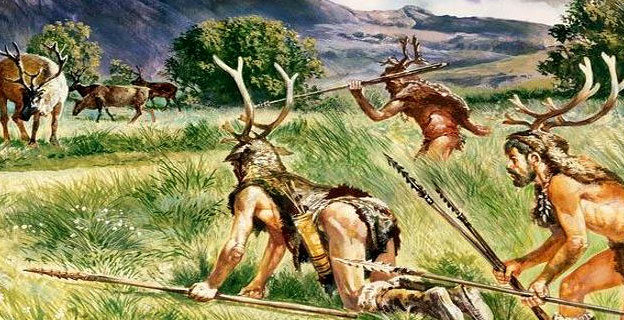How is our pre-historic DNA making us obese? For most of human history, we lived as foragers. This means that for tens of thousands of years we traveled in search of food instead of settling in one place.
Our ancestors’ nomadic lifestyle was dictated largely by the seasonal migration of animals and the growth cycles of plants. (and they were generally in great shape!)
Then, sometime around 10,000 years ago, we collectively decided to settle down. We stopped chasing our food and decided to domesticate animals and plant crops instead.
This relatively swift transition of our species from “hunter-gatherers” to farmers and herders is known as the “Agricultural Revolution.”
History and science books applaud this evolution of our species as “progress,” but in some ways we’re still struggling to make the transition.
Although it’s been a long time since we stalked migrating bison, or dug for edible roots in the woods, our DNA still hasn’t forgotten when food was scarce. Enter the, “gorging gene theory.”

The Curse of Abundant Food
Our lifestyle has changed dramatically over the millennia, but our DNA has been struggling to catch up.
In fact, many of us are consuming nearly double the recommended amount of calories each day.
As food becomes more abundant, more accessible, (and lower quality!) we find ourselves plagued by a worsening obesity epidemic, which is now even spreading to poorer, developing nations.
Obesity costs us hundreds of billions of dollars each year, and puts crushing weight on our already groaning health care system.
Even historically poor rural China is now grappling with an obesity explosion, as 17% of boys under age 19 are obese. (Up from only 1% on 1985)
We don’t want to be fat, so why to we have such a problem eating in moderation?
Part of the answer to this question may be found in our DNA, and the eating habits we formed during the tens of thousands of years when we were foragers.
The “Gorging Gene” Theory
During most of human history, food was generally in short supply. We didn’t have the means to preserve or store much of it, so we were always on the move to find our next meal.
Imagine the excitement of our “hunter-gatherer” ancestors when presented with a greasy slab of freshly cooked bison meat, or upon discovering a tree full of ripe fruit.
Such a bounty of food was rare, and our survival instincts told us to gorge while we could. After all, there was no telling when we’d be presented with such a feast again, and we’d be wise to store extra calories, especially because our ancestors lived such active lifestyles.
Over thousands of years, these eating patterns became imprinted in our DNA. They seem to be contributing to our weight problems today, as (low-quality) food is cheap and abundant in most places.

Our DNA Still Thinks That Food Is Scarce
If you think of human history as a 24-hour day, it’s really only been in the last few “minutes” that food has been so easily accessible and abundant.
You might say that opening an over-stuffed refrigerator today is like our foraging ancestors discovering a bush full of ripe berries in the woods.
Even in a time of abundance, our survival instincts still tell us that food is scarce, and implore us to feast while we can.
The gorging gene is still in our DNA, telling us that food is scarce. (and we listen)
You could say that by trying to eat in moderation (in a time of abundance) we are literally fighting tens of thousands of years of evolution!
- Idea: Don’t drive. Take a long walk or bike to a restaurant or supermarket instead. The extra effort will awaken your “inner forager,” and the food will definitely taste better!
Looking to lose weight? You can try Noom free for 14 days, or check out our coupons for WeightWatchers here.

